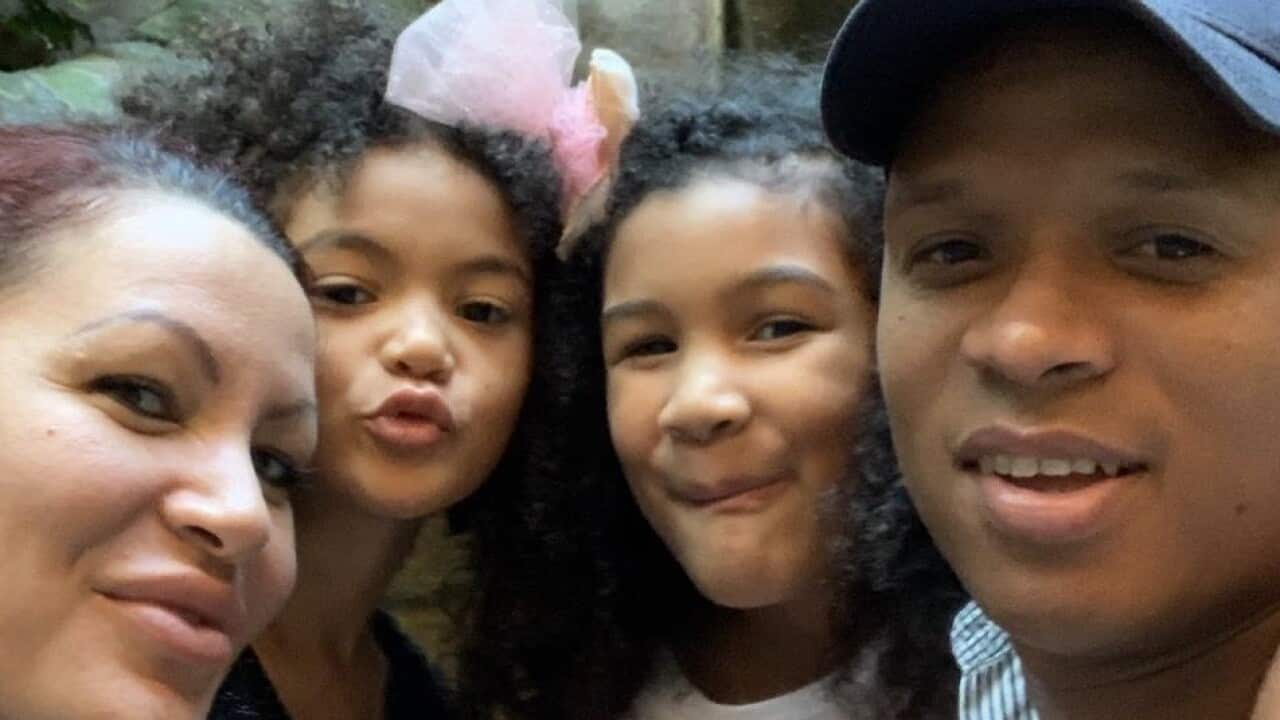Highlights
- Richard Ortega travelled out of Australia in January and has been unable to return to the country due to border closures
- "I don't know why they call it compassionate entry," says Richard, criticising the fact that the situation of minors is not considered when granting travel exemptions to parents
- Australia closed its borders on March 20 when 80 per cent of coronavirus cases had links to imported cases from abroad or were people who were already infected from another country
Every night before bed, Ashley and Ashanty see their "daddy" on their tablet screens.
Although the video call helps to close the distance between Sydney and Stockholm, the girls hope that soon they will be able to hug their father again, the Cuban-Swedish musician, Richard Ortega.
For Richard, not being able to hug his six and seven-year-old "princesses" and help his wife Yahima has been a source of heartbreak and acute anxiety for months.
He has applied for an exemption on compassionate grounds to allow him to travel to Australia, which currently only allows the entry of nationals and permanent residents after it closed its borders earlier in the year due to the pandemic.
After ten rejected requests, the family hopes to reunite before the end of this year.
The Ortega family arrived in Australia in 2018 from Sweden, where they are citizens. They decided to venture to the antipodes after Yahima won a scholarship to study in Sydney.
In January, Richard travelled to Europe to go on a work tour to support his family, before the pandemic hit.
On March 20, when the Australian government closed the borders, coronavirus infections in the country were increasing and the situation in some parts of the world was completely out of control. At the time, up to 80 per cent of confirmed COVID-19 cases in Australia stemmed from overseas travellers.
At the time, up to 80 per cent of confirmed COVID-19 cases in Australia stemmed from overseas travellers.

Richard Ortega and his daughters Ashley and Ashanty. Source: Richard Ortega
Richard was caught completely off guard by the shutting of the borders, like so many other people who were out of the country at that time.
“From there I have made all attempts to return. I have applied for a compassionate entry 10 or 12 times, and I been rejected 10 or 12 times,” he says.
Since the Australian borders closed in March, the Australian Border Force has received more than 87,000 requests for travel waivers.
As of July 31, fewer than 1,800 applications had been approved for the compassionate travel waiver.
This has been a painful situation for me and sad for the girls
Richard believes that the government should take into account the cases in which there are minors involved, who may be affected by their behaviour and learning due to this situation.
"I don't know what they call it compassionate entry," Richard complains, pointing out the contradiction of this type of exemption that was precisely introduced for cases like his, in which one of the parents is separated from their children due to to the closing of borders.
Current exemptions to the Australian entry ban for non-citizens or permanent residents include airline crews, diplomats and New Zealanders living in Australia. There are also exceptions for non-citizens who travel at the invitation of the government, people who provide essential, critical or specialised medical services, military personnel, and people whose visit is in the national interest.
There are also exceptions for non-citizens who travel at the invitation of the government, people who provide essential, critical or specialised medical services, military personnel, and people whose visit is in the national interest.

Richard Ortega during a music session in a cafe. Source: Richard Ortega
Students who are in year 11 and 12 are also included, as long as they obtain the support of their corresponding state or territorial government.
But there is no specific exemption for temporary visa holders, other than the one granted to people who appeal on compassionate grounds.
This is the exemption that Richard has applied for.
Australian Border Force (ABF) Commissioner, Michael Outram, said last week that he would .
These long separations between families can cause stress and even lead to anxiety and depression, as happened to Richard and his wife.
“This situation has caused me stress, it has taken away my sleep. I can't focus on my daily routine,” Richard told SBS Spanish.
He also says that he and his wife were diagnosed with anxiety by health professionals.
But the long wait of six months could have a happy ending very soon because, at the time SBS Spanish interviewed Richard Ortega, he received the news that he had waited for so long.
“An immigration email came in and I didn't want to look, as they had already rejected me like 10 or 12 times. Finally, I looked at it and when I started to read, it said that I was exempt, that they had reviewed my case and they had authorised me," he said.
Richard is unclear about the reasons for the numerous rejections but believes the review came after the reporting of his case in the media.
"I'm quite happy," says Richard, who will now start planning his return to Australia, so that he can reunite with his family as soon as possible, once he completes the mandatory 14-day quarantine.
He says that despite everything, he has had a good experience and that he loves Australia.
"It is important to stay close to family," Richard concludes, hoping that his case can give a little hope to all who are experiencing difficult times in the midst of this coronavirus pandemic.
Richard says that upon his return, the first thing he will do is hug his princesses.


